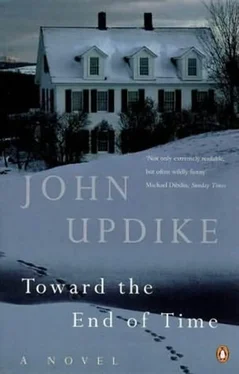John Updike - Toward the End of Time
Здесь есть возможность читать онлайн «John Updike - Toward the End of Time» весь текст электронной книги совершенно бесплатно (целиком полную версию без сокращений). В некоторых случаях можно слушать аудио, скачать через торрент в формате fb2 и присутствует краткое содержание. Жанр: Современная проза, на английском языке. Описание произведения, (предисловие) а так же отзывы посетителей доступны на портале библиотеки ЛибКат.
- Название:Toward the End of Time
- Автор:
- Жанр:
- Год:неизвестен
- ISBN:нет данных
- Рейтинг книги:3 / 5. Голосов: 1
-
Избранное:Добавить в избранное
- Отзывы:
-
Ваша оценка:
- 60
- 1
- 2
- 3
- 4
- 5
Toward the End of Time: краткое содержание, описание и аннотация
Предлагаем к чтению аннотацию, описание, краткое содержание или предисловие (зависит от того, что написал сам автор книги «Toward the End of Time»). Если вы не нашли необходимую информацию о книге — напишите в комментариях, мы постараемся отыскать её.
Toward the End of Time — читать онлайн бесплатно полную книгу (весь текст) целиком
Ниже представлен текст книги, разбитый по страницам. Система сохранения места последней прочитанной страницы, позволяет с удобством читать онлайн бесплатно книгу «Toward the End of Time», без необходимости каждый раз заново искать на чём Вы остановились. Поставьте закладку, и сможете в любой момент перейти на страницу, на которой закончили чтение.
Интервал:
Закладка:
According to the book that proved such a soporific last night, the torus has a rhythm of appearance and disappearance over the aeons, like one of those comets whose elliptical orbits swing far out into interstellar space and by the old Newtonian laws predictably return to our sky. To generations its presence is evident and the source of omens, miracles, admonitions, and reassurances. People live by its wan light, sing its praises while they work, construe even their humblest bodily functions and pangs of pleasure and contrition as parts of a pattern the torus by its ideality establishes. Then it gradually dims, succumbing to mockery and disproof. The generations grow bored with repeating the pieties of their fathers; a cry for human freedom and self-expression rises against the skyey wedding ring, which has come to seem a shackle, or the lid of an oubliette. The chants, perhaps, drive it away. Since it never touches the planet with more than a sense, in certain transits, of global well-being, it can be ignored so thoroughly as to be practically nonexistent.
The altars are slighted; the temples fall into mossy ruin. And yet an air of irresolution hangs in the emptiness. Public disorder increases. Telephone booths are vandalized; graffiti cover every stone surface consecrated to beauty and visual harmony. Children acquire guns and shoot each other as casually as images are flicked away on television; adults drown their disquiet and despair in alcohol. The world by itself is not enough; there must be another, to give this one meaning. And blood sacrifices are initiated by the tyrants who come to power in the resistless confusions and lassitude: giant drums and smoke pots call out to the red-streaked sky; drugged adolescents, chosen for their physical perfection, have their hearts cut out of their heaving chests by hooded priests wielding sea-green obsidian knives.
Eventually, in its own time, the torus reappears. Personal sanity and public decency are restored, but always with seeds, smaller and darker than mouse turds, of discontent and resentment sealed within the social order. The new cycle has begun. Those cycles occupy far more time than was at first thought: millions of years, rather than thousands Time grinds the ruins of one epoch, its imperishable monuments, into a fine sand that seems an utter desert to the forebears of the next epoch as they emerge, hand in hand, their nakedness clothed in leaves, out of Eden. And always overhead, silently clamorous, imperiously silver and pure, the stars rotate and ever so minutely shift, forming new constellations, new arrangements in the sprawl of eventually dying sparks on the velvet display-cloth of space. The sea through the thinning trees wrinkles in red filaments that threadily reflect the bloated, never-setting sun.
Walking back up the driveway, the Globe in hand, I glance to my left at the sourwood tree that Gloria planted ten years ago and am struck, hard, by its seasonal beauty-long oval leaves, deeply creased like peach-tree leaves, overlaid one upon the other in the lower branches to form a screen of crisscrossing scarlets and browns and freckled yellows and pinks and greens. Gloria has gone, yes, sour on this tree-it grew too eagerly for her taste, between the pears and the lilacs. It quickly towered over them, and heavy snows broke off its overextended branches, which then sprouted an awkward spray of secondary shoots. She even talks of cutting it down, after ten years of trial. The gardeners of the world are unsentimental about correcting mistakes. Perhaps I have for it a certain fellow-feeling. Uncherished, rarely glanced at, the sourwood is humming to itself a complex chorale of autumn colors and at the same time extending outwards, like so many long-boned feathery hands, its flowers, which are spent flowerets a third of an inch high organized into one-sided fanning racemes. It blooms even as it sheds.
Then, around four this afternoon, when the sun was angled just right, I wandered into the seaward guest room- not the one I sleep in, overlooking the driveway circle-and was stunned by a window uniformly loaded, like a fabric pattern, with sunstruck butter-yellow hickory leaves. A window like an upright case of pure unfettered brightness.
I see now too late that I have not paid the world enough attention-not given it enough credit . The radio, between the weather and the stock report, releases a strain from Schubert’s Drei Klavierstücke , a melody that keeps repeating, caressing itself in sheer serene joy, and I think of him and Mozart, dying young and yet each pouring out masterpieces to the last, rising higher and higher as their lives fall from them, blessing with their angelic ease the world that has reduced them to misery, to poverty, to the filth and fever and the final bed. My eyes cannot help watering, a sure sign of senility.

Gloria has found herself, through the agency of FedEx and its omnivorous networks, a deerslayer. He comes to the house in a dusty green truck, splotched camouflage-style, and parks in the driveway or else down at the entrance to the dirt road, beyond the mailbox. I shuffled downstairs to meet him. He stood just inside the front door, on the Qum rug. He is a man about my age, a bit smaller and more wiry, but with that same dry flattened gray thinning hair and those same horny splotchy backs to his hands. His hands tremble from a history of drink or the beginning of Parkinson’s. Ht has crowded-together, brownish lower teeth and a lovely gentle voice. There is something holy about him. He talked to me of “signs,” meaning turds, in the woods, and of laying gossamer-thin blue threads across likely trails in the woods He described to me how a deer, once struck by an arrow, with bed down immediately in a nest of brambles and let itself be approached for the kill, since it does not associate the stunning, unhinging thing that has happened to it with human beings; it doesn’t have the circuitry to make the connection. This holy man is of the opinion that animals don’t feel pain at all as we do. They are of another, virtually pain-free order. He hunts them with a bow and arrow because of the sport-he is, like me, retired; more happily, it would seem: he once climbed poles and read electric meters for a living, which may have encouraged habits of stealth and quick observation-and because he and his wife love venison. I had never heard before of a woman liking venison, but, then, in many ways I am still innocent, especially about women. The two of them carve up the carcass and keep it in their freezer for years, like a couple in a fairytale hut. The archery season begins soon, in early November. He will set up a blind, in a likely spot, and stand motionless in it for hours, beginning at 5:00 a.m. What monk in a cold stone cell could do more to punish himself? He is another of Gloria’s saints. Her father was a saint of propriety; this man-named, like her father, John-a nature saint, blending selflessly with the trees, and brush, and rocks.
His existence crowds my universe, diminishes it and me, yet I am curious to see what will forthcome.
Speaking of masculinity, Red and Ken came to visit me, looking sheepish that they have not visited before. But the golf season had been active until a week or so ago, and they filled me in on the results of the Labor Day Weekend Four-Ball, the Fall Mixed Gambol (you had to play with somebody else’s wife, a source of endless titillation), the Senior Men’s Championship (over fifty-five), the Plimpton Super-Seniors (over seventy, named after Ed Plimpton, a Mass. Amateur Championship runner-up who had been a member of the club), the Columbus Day Best-Ball, and a new tournament scored by the Stableford system and named in honor of an assistant pro, Dale MacPhail, who had been killed in the war, obliterated in an Aleutian missile silo.
Читать дальшеИнтервал:
Закладка:
Похожие книги на «Toward the End of Time»
Представляем Вашему вниманию похожие книги на «Toward the End of Time» списком для выбора. Мы отобрали схожую по названию и смыслу литературу в надежде предоставить читателям больше вариантов отыскать новые, интересные, ещё непрочитанные произведения.
Обсуждение, отзывы о книге «Toward the End of Time» и просто собственные мнения читателей. Оставьте ваши комментарии, напишите, что Вы думаете о произведении, его смысле или главных героях. Укажите что конкретно понравилось, а что нет, и почему Вы так считаете.












